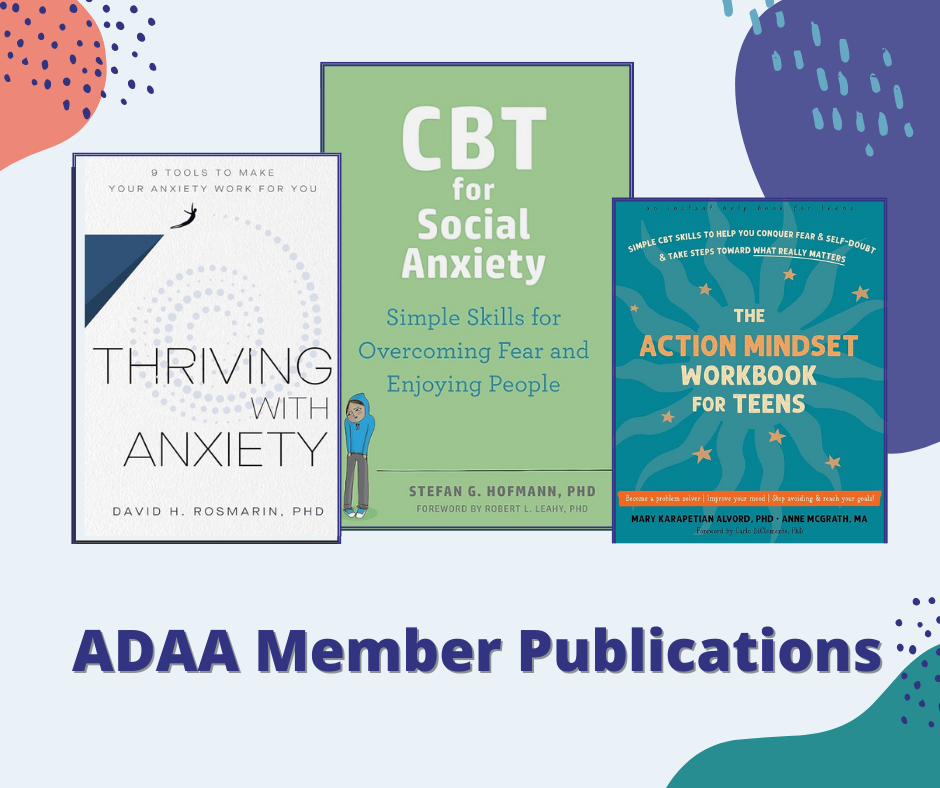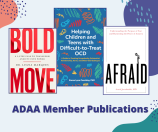New ADAA Member Books! Fall 2023
New ADAA Member Books! Fall 2023

Take Action with Dr. Mary Alvord’s The Action Mindset Workbook for Teens
What does it mean to have an action mindset? How does a workbook for teens help them change the way they address, or in some cases don’t, their anxiety, self-doubt, and fears? How can it help them face fears that get in their way of meeting new challenges, like trying out for a sports team or auditioning for a play or making new friends?
ADAA member Mary Karapetian Alvord, PhD, understands that changing deeply ingrained behavior patterns, for teens and adults alike, is not easy. The psychologist and Director of Alvord, Baker & Associates knows - from over 40 years of clinical experience with children, adolescents, and young adults - just how hard the mind resists change.
Altering your mindset from one of avoidance and paralysis to one of taking action, facing awkward or uncomfortable situations, and working through fears is possible, and attainable. According to Dr. Alvord, an action mindset alleviates and improves anxiety, sadness and insecurity, leading to not only a better quality of life but to a proactive approach to living.
The Action Mindset Workbook for Teens, by Dr. Alvord and Anne McGrath, MA, offers advice and exercises but also offers examples of common, relatable teen avoidance behaviors and strategies to help tolerate the discomfort that freezes them in their tracks. The book highlights the need to solve problems, rather than avoid them, and gives special focus on the paralysis that often results from social anxiety, perfectionism, excessive worry, and depression.
“In my practice, I regularly see that teens who avoid people and new challenges out of anxiety or sadness do feel relief in the short term,” Dr. Alvord told ADAA, “but they become more anxious, dejected and paralyzed in the long run.”
Through an examination of their values and motivations, the teens then develop an action plan of steps to take to meet a certain goal. The workbook uses CBT skills such as cognitive restructuring to counter negative thoughts, exposure techniques to help them adjust to discomfort, behavioral activation to cope with sadness and depression, and also calming strategies like mindfulness and progressive muscle relaxation.
Order The Action Mindset Workbook for Teens here.
Lose the Fear, Enjoy People, and Succeed in Social Situations with Dr. Stefan Hofmann’s New Book
Whether you have a diagnosis of social anxiety or feel extremely awkward and uncomfortable in social situations, ADAA member Stefan Hofmann, PhD, can help. As a scientist and clinician, Dr. Hofmann has studied and treated social anxiety his entire career. His new book, CBT for Social Anxiety: Simple Skills for Overcoming Fear and Enjoying People, offers effective, evidence-based skills and strategies for those whose social anxiety is holding them back.
The University of Marburg professor and international expert in Cognitive Behavioral Therapy (CBT) has developed throughout his career an effective medication-free intervention for social anxiety that he says, “turns this demon into a kitten.” For those who struggle with the disorder, a social situation can truly feel like an overpowering monster. But, he says, it doesn’t have to.
“This treatment has been tested in many rigorous scientific trials showing that close to 7 to 8 out of 10 people will experience dramatic improvements,” Dr. Hofmann told ADAA. With those results, your social anxiety, whether it be public speaking, meeting new friends, going on a job interview, or whatever is preventing you from living the life you want, can take backstage.
While avoidance may give you short term relief, it is actually worse in the long run. In his book, the current Alexander von Humboldt Professor of Translational Clinical Psychology at Germany’s prestigious Philipps University Marburg outlines skills that will help you learn to face your social anxiety head on.
Order CBT for Social Anxiety here.
Dr. David H. Rosmarin’s Newest Book Gives Us 9 Tools to Thrive with Anxiety
Anxiety is a normal part of human existence. Most of us know this intuitively, yet we strive so hard to be rid of it. We fight against our anxiety, which only makes it worse and allows it to take more control. What if we could actually turn anxiety into a strength? What if anxiety could help us to thrive?
In his new book (release date October 17, 2023), aptly titled Thriving with Anxiety: 9 Tools to Make Your Anxiety Work for You, ADAA member David H. Rosmarin, PhD explains how we can change our relationship with anxiety. While anxiety might not feel like a friend, it doesn’t have to be our adversary.
Dr. Rosmarin, a Harvard Medical School associate professor and founder of Center for Anxiety, says that anxiety can be turned into a strength. His approach shows that instead of exhausting ourselves trying to either cure anxiety or concede to a life of fear and worry, we can instead turn it into a tool. Dr. Rosmarin is an international expert on spirituality and mental health, whose work has been featured in major journals and media articles. He offers a constructive, compassionate, and evidence-based approach.
“Our society’s expectation to be anxiety-free is neither realistic nor helpful,” Dr. Rosmarin told ADAA. “Rather than being something we dread and avoid, we can use anxiety to enhance our lives if we employ the right skills and tools.”
Thriving with Anxiety will help you learn to use anxiety as a tool to: be more self-aware, self-accepting, and resilient; understand and relate to others; have more emotional intimacy; be more accepting of life; and push forward to accomplish what you really want.
Preorder Thriving With Anxiety here.
View ADAA's bookstore/reading list of our members' self-help books.
Read all of the ADAA Member Book Blogs here.























